It is the fourth day that Azerbaijanis do not open the only road connecting Artsakh to Armenia. You have probably read and heard these words dozens of times in recent days. That alarm-like sentence is in the air, especially among the mountains of Lisagore. Here is the checkpoint of the Russian peacekeepers, which does not open for going to Stepanakert. Lisagor, Yegtsahogh, Mets Shen and Hin Shen settlements of the Shushi region remained on the other side of that checkpoint as Azerbaijani "environmentalists" cut the connection with Stepanakert on the other side.
Because of the blockade of movement, 1100 people, including more than 270 children, cannot return home. Patients in need of urgent medical care cannot be transported to Armenia for professional care. The supply of food and medical supplies has stopped.
Due to the closure of the road, some men spend the night in their cars, some people who could not reach their homes found a temporary roof in nearby Lisagor, and hundreds of people went to Syunik Marz, Yerevan, or other settlements.
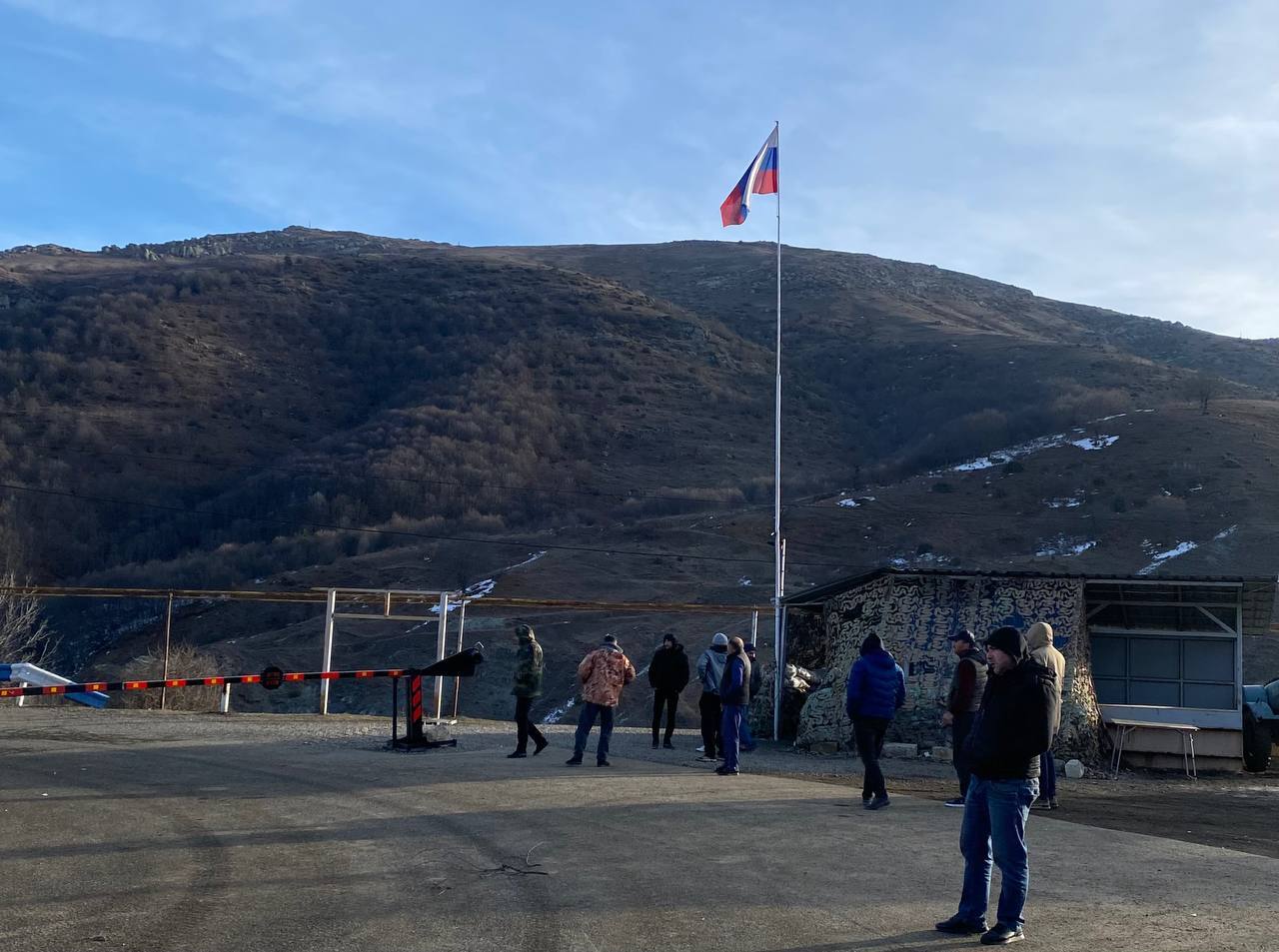
The men are approaching the checkpoint of the Russian peacekeeping forces, hoping that now they will finally hear the news: the Azerbaijanis have opened the way. But everything ends at the intersection of the indifferent or maybe purely official look of the young peacekeeping trooper and the cigarette burning between the frozen fingers of the Artsakh citizen.
Irina, an employee of the Lisagor village administration, offers coffee and tea to those standing outside, who also say encouraging words to each other. Irina Babajanyan left to talk to her sister on the phone. A sentence comes out of the room. "Let's go shopping, the shops are emptying already."
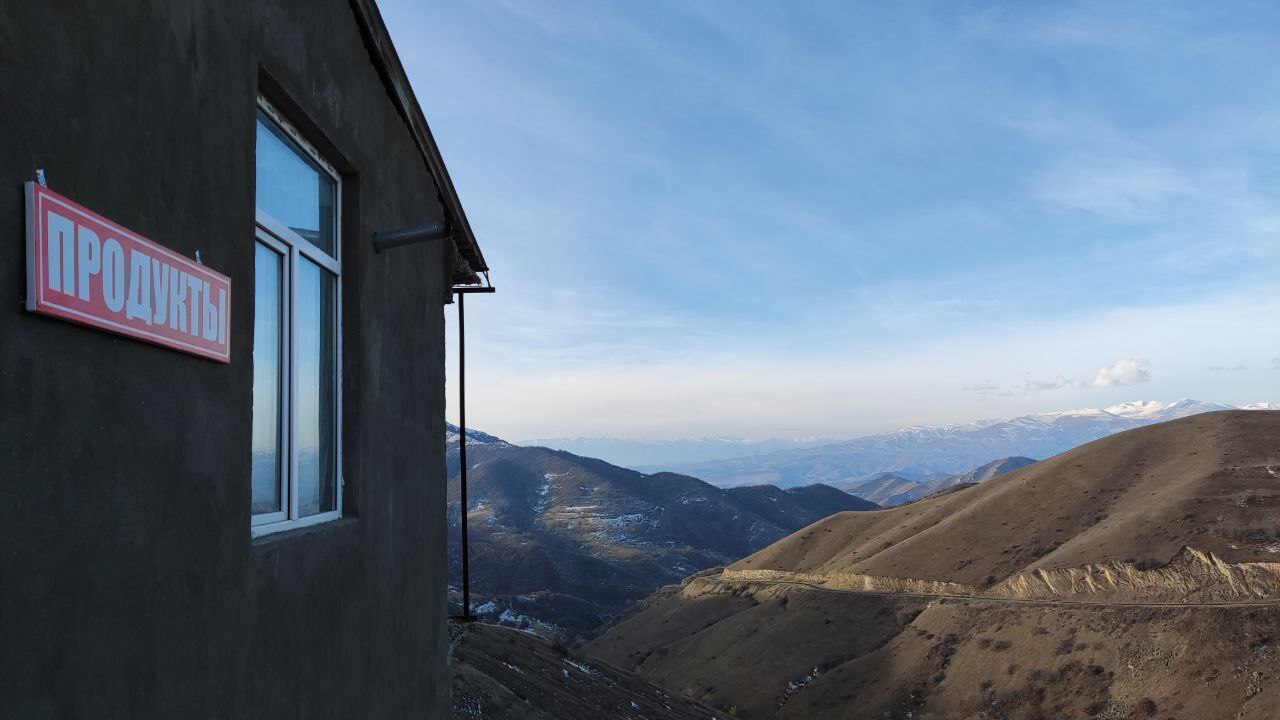
Mrs. Irina tells that when they found out that the Azerbaijanis blocked the road, they did not panic, because this was not the first case. Only this time it took longer than expected, in the previous times they were closed and opened for ten minutes, one or two hours. People were probably used to these short-term provocations, but they probably did not want to imagine that they would not see their relatives for days, and they would remain in the blockade for days. Mrs. Irina does not hide that she has worries, but she emphasizes for the second time that there is no panic.
She says that people solved their household, health, and social issues through the connection with Stepanakert, and now that the vital connection has been cut, the village shop is also closed.
"We keep our daily food in the village: macaroni, flour, we buy so little and nothing, because we don't think about the future... Or there is not so much opportunity to buy a lot at once. We buy the rest of the things from the shops every day, we can't do it every day, right? All this was done through the connection of Stepanakert. We can overcome most of these domestic problems, but this lifestyle will be very difficult for us," she says, telling that when they learned that the road was closed and people stayed outside for a cold day, they immediately arranged that they have a place to stay. More than forty people were accommodated in the houses of Lisagor residents.
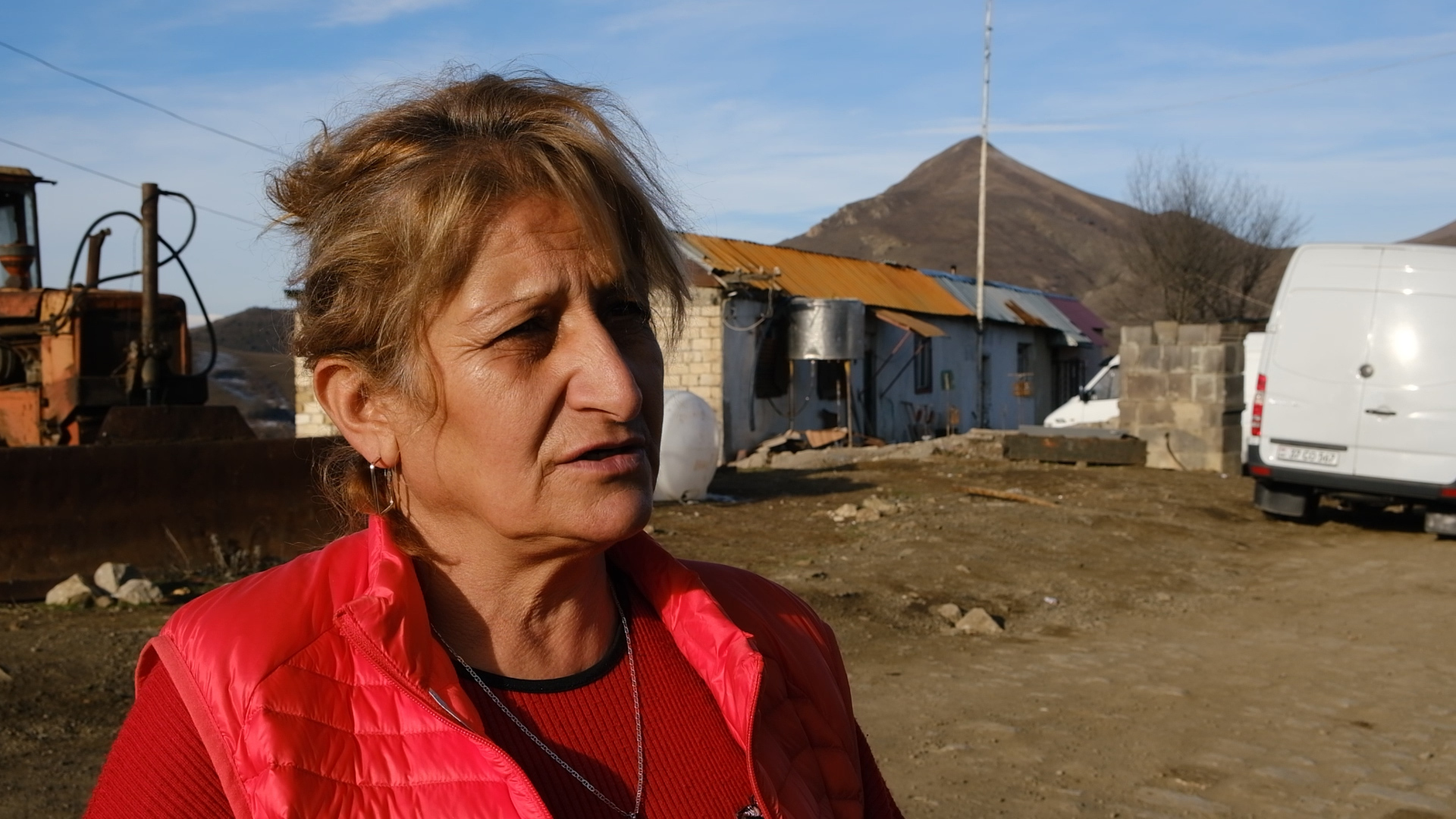
Irina Babajanyan
"It's true, at that moment the head of our community was absent for a good reason, he has health problems, but he helps in everything," says Mrs. Irina, and it turns out that the village head was discharged from the hospital in Stepanakaret and did not manage to return, and remained in Artsakh in the capital.
Mrs. Irina's daughter and grandson also went to Stepanakert and could not come back. But he continues to believe. Every moment we expect something good, every moment, there has always been a difficulty, we have overcome it."
Most of the people gathered at the checkpoint of Russian peacekeepers located near Lisagor are drivers of cars loaded with food. Among them are Arsen and Gurgen, who are watching our conversation from a distance and who also could not reach Stepanakert. Arsen Khachatryan says that on the way to Stepanakert, they learned that the Azerbaijanis had closed the corridor, but, hoping that they would open it soon, they continued to come.
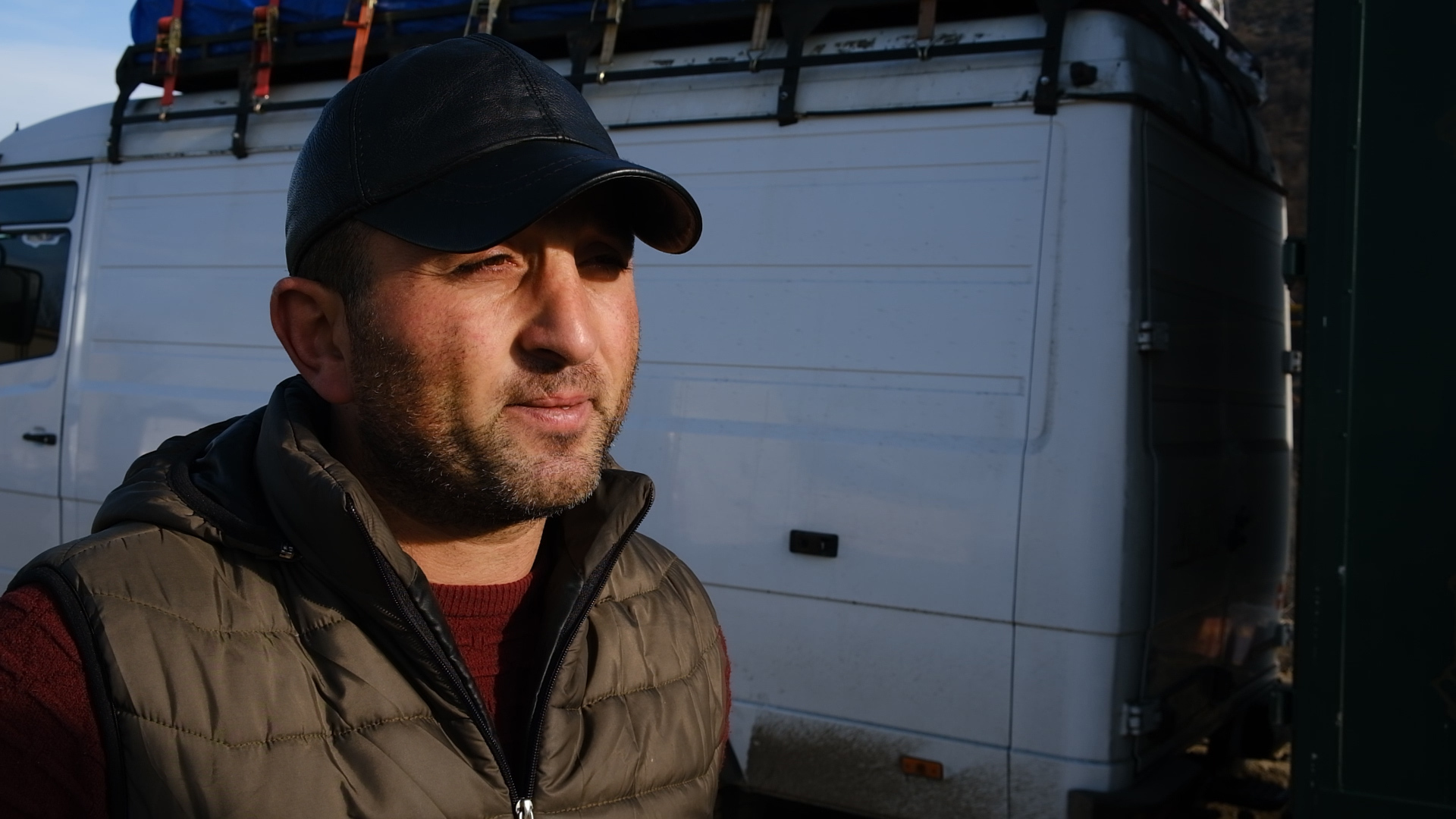
Arsen Khachatryan
"We came to our post in Tegh village and stayed for one night, then they told us to come to Lisagor, that is, we are here for four days, we are waiting. Some - in the car, some - at a friend's house, we will see what happens," says Arsen, whose family is also in Stepanakert during the blockade.
"We talk to the child on the phone, we are happy when we call."
Arsen's friend, Gurgen Gabrielyan, who smiles modestly, is perhaps the most impatiently waiting for the road to open: his wife will give birth to a child soon, few days left. Gurgen says that he will wait a little longer and tell the peacekeepers about this, he will ask them to come with them to Stepanakert so that he can be with his wife.
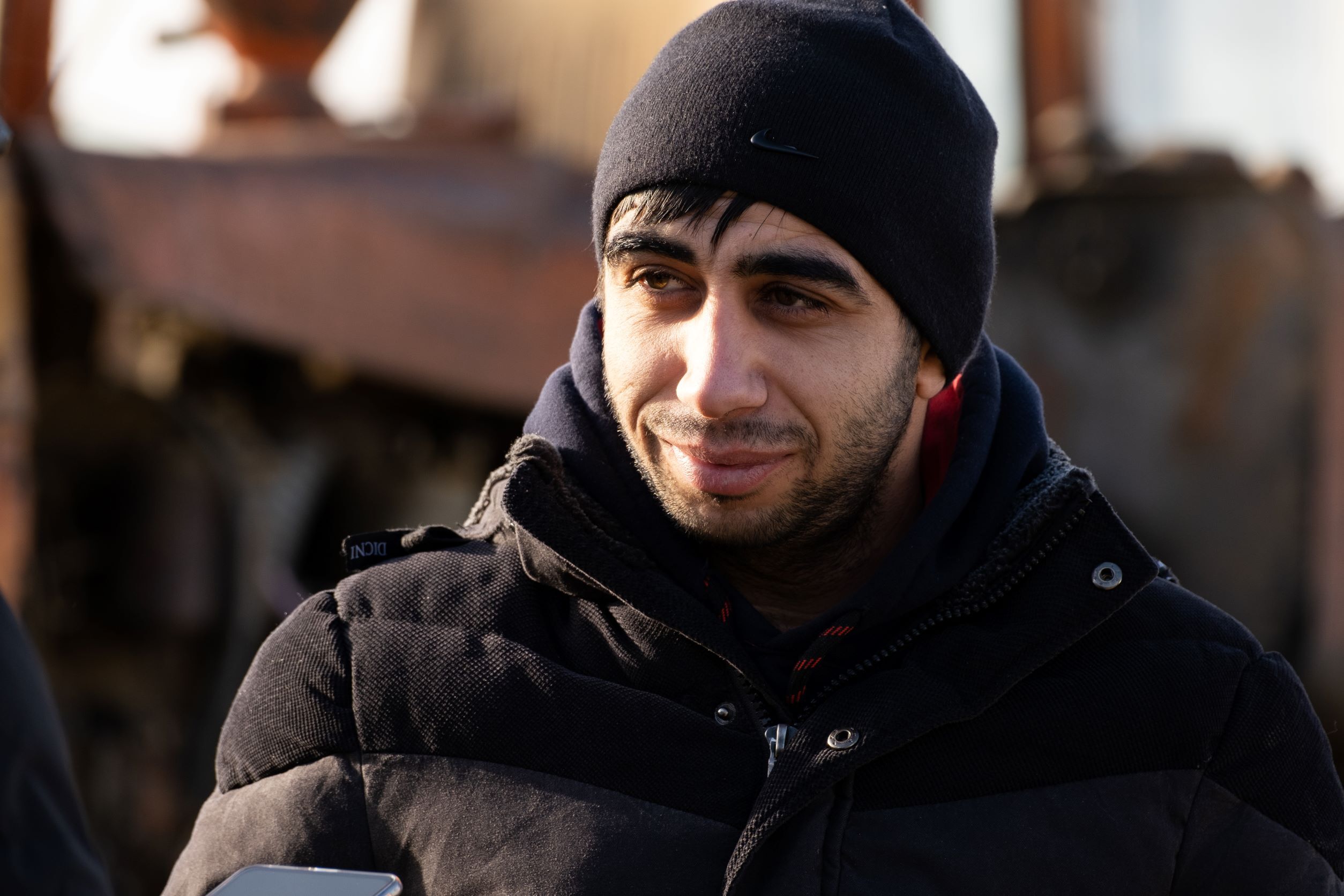
Gurgen Gabrielyan
By the way, Arsen is from Taghavard village in the Martuni region of Artsakh. From the part of the camp which is now under the control of the enemy. Arsen now lives in Stepanakert. And Gurgen who is from the village of Chartar in the Martuni region, lived in Shushi for some time, until it also came under the control of the enemy. Now he also lives in Stepanakert. Our attention is diverted when we hear two peacekeeping officers counting the parked trucks.
"Eleven," says one of them with an indifferent look, the other corrects: "No, fourteen." They decide to take another look. There is a hushed conversation among people with their hands in their pockets from the cold, "as if they want to open the way for food trucks, women and children." But enthusiasm does not enter them, as if they do not believe. They say that they have come a thousand times in the past few days to say that the road will soon be opened, in two hours, in three. But on the fourth day, it does not open.
We arrived very early in Lisagor. We reached the place almost after sunrise. After several hours of harsh conversations, we decide to turn back. We wish success to the people, we share their wish, and we are all waiting for Gurgen to do something, get to his wife, even if only he goes first. And we go back, recalling in our mind how many checkpoints of peacekeepers there are ahead when we have to prepare the passports. We think that if we reached Lisagor unhindered, it will be easier to go back, like going down the "road". At the first checkpoint, the young Russian man approaches the ticket, rises it up, and we pass, after a few minutes we see their bases, then the next checkpoint.
The Russian officer comes out of his checkpoint located near the Hin Shen settlement and, walking in the direction of our car, showing us to go back. He approaches the window of the car and says, "It's closed."
- Why?
- The exit and entrance are closed. Turn around, go back.
- Where, back to where?
- Where did you come from?
- We left from Goris.
- Well, the exit is prohibited, as well as the entrance. We have an order.
- But we...
And from here the young man doesn't listen anymore, he says it, turns around, and goes. We go out and approach the other servant, who, according to everything, is discussing this issue with his superior. At that time, only our car was standing in the direction going to Goris, another car was standing in the opposite direction to Lisagor.
A few words are heard from the hand-held radio device of a Russian peacekeeper. "Let them go now, but warn them they cannot come back."
The Russian peacekeepers open the boom barrier, stressing again that in case of coming back, entry is prohibited. We move forward, and the officer at the next checkpoint also gives a similar warning. To the question: what is the problem, is there a new order, and how long will this ban last, he answers that there is a new order, and maybe it will be settled after lunch (this text is written about an hour after the conversation, and currently we have no new information about the situation on the ground). The last checkpoint is in the Tegh community. This is an Armenian checkpoint, where we ask the officials why the road to Stepanakert is already closed near the Hin Shen settlement. But the officials do not give a clear answer, they say that they were closed by the Russian side. And when we were near Tegh checkpoint, the cars were already stopping there.
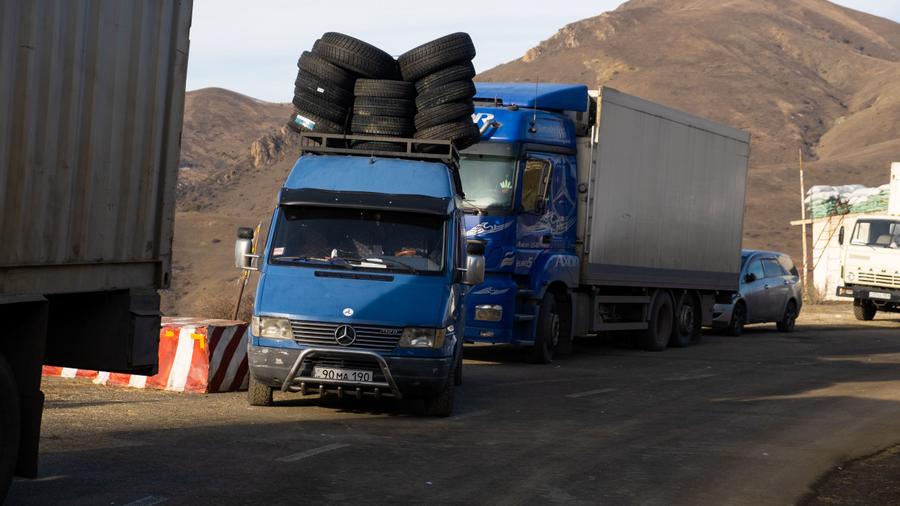

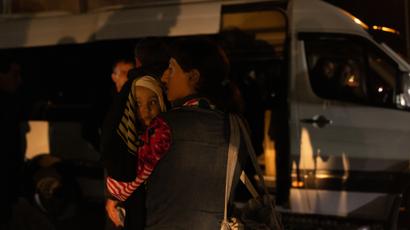
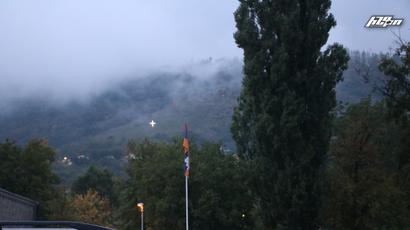
!["I don't want my children to starve, to be subjected to genocide, I want to live in Artsakh, to build our Homeland" [Blockade from the inside]](https://cdn.infocom.am/enlarge?file=2023-08-10-4865f192-ab13-4e84-beab-6232fbca7831.jpg&type=jpeg&width=410&height=230)
!["It's truly unbearable to be captive on your own land; everyone wants to live, yet the possibility of life is uncertain" [Blockade From The Inside]](https://cdn.infocom.am/enlarge?file=2023-08-07-4da13b91-9ae8-4497-a322-a6173bea598d.jpg&type=jpeg&width=410&height=230)
![A mother of five from Artsakh prepares sweets using the last remaining ingredients at home and shares them with neighboring children. [Blockade from the inside]](https://cdn.infocom.am/enlarge?file=2023-08-07-a38344bf-93f4-46f3-be0d-27ad2e27cf27.jpg&type=jpeg&width=410&height=230)
!["When we are in our own country, we endure whatever comes our way; the crucial thing is that we live here as Armenians, bread and hunger, though difficult, are not the primary focus." [Blockade from the Inside]](https://cdn.infocom.am/enlarge?file=2023-08-05-465609c7-c0fd-42d2-9db7-2a568a7428a5.jpg&type=jpeg&width=410&height=230)
!["I will sleep hungry, I won't even eat sweets, but in exchange, I expect to live in my motherland, Artsakh" [Blockade from the inside]](https://cdn.infocom.am/enlarge?file=2023-08-05-ab9a84b3-3f5e-4bcd-b049-5e8660312ed8.jpg&type=jpeg&width=410&height=230)
comment.count (0)